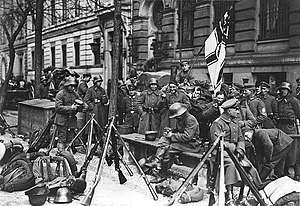Kapp Putsch
The Kapp Putsch, also known as the Kapp–Lüttwitz Putsch, named after its leaders Wolfgang Kapp and Walther von Lüttwitz, was an attempted coup against the German national government in Berlin on 13 March 1920. Its goal was to undo the German Revolution of 1918–1919, overthrow the Weimar Republic, and establish an autocratic government based on fascism in its place. It was supported by parts of the Reichswehr, as well as nationalist and monarchist factions.

Though the legitimate German government was forced to flee the city, the coup failed after a few days, when large sections of the German population followed a call by the government to join a general strike. Most civil servants refused to cooperate with Kapp and his allies. Despite its failure, the putsch had significant consequences for the future of the Weimar Republic. It was one of the direct causes of the Ruhr uprising a few weeks later, which the government suppressed by military force, after having dealt leniently with leaders of the putsch. These events polarized the German electorate, resulting in a shift in the majority after the June 1920 Reichstag elections.
Some believe that the Kapp Putsch may have partially inspired Adolf Hitler and the early Nazi Party to carry out the Beer Hall Putsch of 1923 (which also failed), as many of the Kapp Putsch's key participants would join the Nazi Party, Also, Erich Ludendorff had a key role in organizing both events.